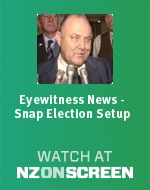Trades Hall bombing
On 27 March Ernie Abbott, the caretaker at Wellington’s Trades Hall, was killed instantly when he picked up a booby-trapped suitcase that had been left in the foyer of the building. The crime remains unsolved. Trades Hall was the headquarters for a number of trade unions, which are commonly assumed to have been the target of the bombing. A theory that it was a response to a bus strike the previous day was discounted by the police, who concluded that it would have been difficult to assemble and place the device so quickly. Others speculated that the culprit was a suspected killer who was on the run from the IRA.
Snap election
Robert Muldoon surprised many with his decision to call a ‘snap election’ for 14 July. National had a slim two-seat majority in the House. Though National MP Marilyn Waring had announced her support for an opposition-sponsored anti-nuclear bill, she had not threatened to vote against the government on issues of confidence and supply. Nevertheless Muldoon decided to put his mandate to the test four months before the end of the parliamentary term, hoping to catch his opponents unprepared. This plan backfired spectacularly when National was dealt a heavy defeat by the highest official turnout of voters − 93.7% − in New Zealand’s electoral history.
Gold bonanza in Los Angeles
New Zealand enjoyed its most successful ever summer Olympics at Los Angeles, winning a staggering eight gold medals (in a total of 11) to rank eighth on the medal table – six places ahead of arch-rivals Australia. All but one of the gold medals were won on the water, with four going to canoeists. Ian Ferguson established himself as our most successful Olympian ever with three gold medals (he won a fourth four years later in Seoul). Ferguson had first represented New Zealand at the Olympics in 1976 at Montreal. In 1980 he was one of the four Kiwi athletes to ignore government pressure to boycott the Moscow games. Sailors Russell Coutts and the duo of Rex Sellers and Chris Timms also won gold, as did the men’s rowing coxless four. Mark Todd (riding Charisma) was our only land-based gold medallist.
‘Poi E’
Songs sung in Māori have rarely hit the charts in New Zealand, but in March 1984 ‘Poi E’ featured for 22 weeks, four of them at no. 1. In 1982 Ngoi Pewhairangi and Dalvanius Prime wrote ‘Poi E’ and two other songs in a single day, but record companies weren’t interested. Prime decided to form his own label, Maui Records, and recorded ‘Poi E’ in late 1983. The Pātea Māori Club provided the vocals above a funky rhythm that featured bass, Linn drums and a synthesiser. Commercial radio barely played the song until a story on TV’s Eyewitness News gave it its big break.
Other 1984 events
- In March the last tolls were collected from drivers on the Auckland harbour bridge.
- In April Susan Devoy won the first of eight British Open squash titles.
- Muldoon’s initial refusal to heed an instruction from incoming Labour Party Prime Minister David Lange to devalue the currency sparked a brief constitutional crisis.
- The Te Māori exhibition opened in New York. A milestone in the Māori cultural renaissance, it enjoyed hugely successful runs in New York, St Louis, San Francisco and Chicago before returning to tour New Zealand to further acclaim.
- On 7 December Dave Dobbyn was arrested for allegedly inciting the ‘Queen Street riot’ during a free rock concert in Auckland’s Aotea Square.
- The New Zealand men’s cricket team defeated England in a test series for the first time by winning the second test at Lancaster Park, Christchurch.
- New Zealand ratified the UN Convention on the Elimination of all Forms of Discrimination Against Women (CEDAW).
- A state of emergency was declared in Southland on 27 January following record rainfall which forced the evacuation of 4000 people and left flood damage totalling $55 million.
- The Dance Exponents were the big winners at the annual music awards, taking both Album of the Year (for Prayers be answered) and the Top Group Award, while lead singer Jordan Luck won Top Male Vocalst. Fellow Christchurch band The Narcs took out Single of the Year with ‘You took me heart and soul’.
- Came a hot Friday, described as ‘the funniest, liveliest, most exuberant film ever made in New Zealand’, was the local runaway hit of the year. Vincent Ward’s debut feature Vigil became the first New Zealand film selected for competition at the prestigious Cannes Film Festival.
Do you remember 1984? Add your memories and comments in the form below.









Community contributions